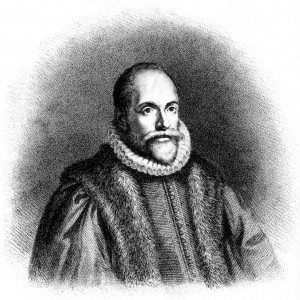“In essentials, unity; in opinions, liberty; in all things, love.”
 Barton Stone didn’t come up with that old Restoration slogan. Neither did Alexander Campbell. Nor Thomas. It’s certainly a Restoration Movement marker. It identifies us. We’ve used it out front and center, rallied around it, preached it in our pulpits and published it in our papers for more than 20 decades. But it’s not exclusively ours.
Barton Stone didn’t come up with that old Restoration slogan. Neither did Alexander Campbell. Nor Thomas. It’s certainly a Restoration Movement marker. It identifies us. We’ve used it out front and center, rallied around it, preached it in our pulpits and published it in our papers for more than 20 decades. But it’s not exclusively ours.
“In essentials, unity; in opinions, liberty; in all things, love.”
I’ve always believed it was Stone or Campbell who came up with this inspirational motto. I think I’ve always been told we’re the ones who started it. As a unity movement, a restoration revolution that sought to destroy all denominational barriers and bind all believers together in our common Lord, it makes sense that we’re the ones who made this up. But we didn’t.
“In essentials, unity; in opinions, liberty; in all things, love.”
I’ve always loved this slogan. I adopted this slogan from almost the moment I first heard it as a teenager reading a paperback history of our Stone-Campbell heritage. It’s a powerful little statement, full of energy and potential and life. Just look at what it says: 1) We in the Churches of Christ believe that there are only a very few things that are absolutely essential to the faith and those are things we must all hold to and protect; 2) we in the Churches of Christ believe there are countless numbers of things about discipleship to Jesus that don’t really matter that much, there are myriad opinions that go with each of those issues, and we should all be confident to express those thoughts and views with great freedom; and 3) we in the Churches of Christ believe that in all these things with which we certainly agree and might possibly disagree, we love one another with an unconditional acceptance and grace.
paperback history of our Stone-Campbell heritage. It’s a powerful little statement, full of energy and potential and life. Just look at what it says: 1) We in the Churches of Christ believe that there are only a very few things that are absolutely essential to the faith and those are things we must all hold to and protect; 2) we in the Churches of Christ believe there are countless numbers of things about discipleship to Jesus that don’t really matter that much, there are myriad opinions that go with each of those issues, and we should all be confident to express those thoughts and views with great freedom; and 3) we in the Churches of Christ believe that in all these things with which we certainly agree and might possibly disagree, we love one another with an unconditional acceptance and grace.
That’s what the slogan says. And I’ve always cherished it. I think the slogan has meant so much to me because in most of my Church of Christ upbringing and life, my experiences have been just the opposite of what our slogan stands for. The slogan always represented a Scriptural ideal that my Restoration forefathers aspired to and one that should still compel our religious endeavors. Despite our obvious and intentional obliteration of the slogan’s mandates, I always saw the slogan as something to which we ought to turn back, toward which we ought to strive.
“In essentials, unity; in opinions, liberty; in all things, love.”
This was our slogan and I’ve always been proud of it. I’ve always thought this was something we could point to as a great contribution to the wider Church conversation. We came up with that. We’re not very good at following it. But at one time, we thought these things were really important and, someday, we might again think they are really important. And, if by God’s grace that day ever comes, we might really make a difference in this broken world for Christ!
But it’s not ours.
I was somewhat disappointed to learn at the Arminius conference last week that the slogan has been used by church reformers and restorers, by religious rebels and remonstrants, for more than 400 years. It was first coined by Lutheran theologian Peter Meiderlin in the early 17th century, in a different place, but at the same time as the Arminius-Calvin controversies in the Dutch Church.
Arminius-Calvin controversies in the Dutch Church.
It’s Lutheran.
Hans Rollmann has published his own extensive research into the origins and evolutions of the slogan, including its use in the dedication of a Roman Catholic Church in Neuweid, among Bohemian Brethren, Quakers, Puritans, and in our own Restoration history. The most disturbing part of Rollmann’s study is his conclusion that Barton Stone never once personally endorsed the slogan. He didn’t believe in it. He thought it was too reductionist. In fact, Rollmann contends that the slogan was only first used in our Restoration churches during the post-Civil War disputes regarding slavery, instrumental music in worship, and premillinialism. (You can access Rollmann’s report in its entirety by clicking here.)
“In essentials, unity; in opinions, liberty; in all things, love.”
I still like the slogan. I still like the ideals it affirms of one common salvation because of our one common faith in our one common Lord and of an unconditional and godly love for one another that transcends all other things. I still like the slogan and still believe it’s something we can and should strive toward.
It’s just not exclusively ours. It’s much older and it’s much more universally held. And I think today that makes the slogan even better.
Peace,
Allan





Recent Comments